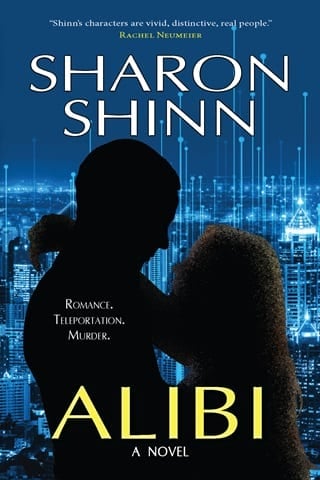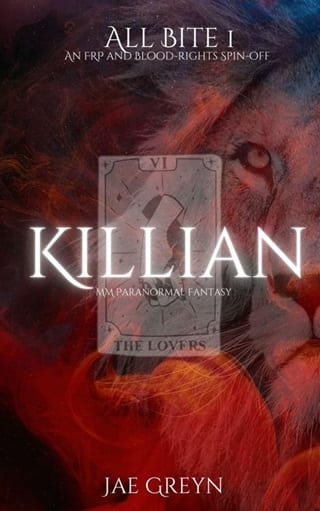CHAPTER TWENTY
Monday, I spent a few hours at Northwestern General, meeting the Kyotenin degradation specialists and gathering information about the new cloning program. The doctors seemed mystified to learn that I was not the relative of a child suffering from the syndrome, but they were perfectly willing to give me the specifics I wanted.
Tuesday, I teleported to the Phillips mansion about a half hour before I was expected, but I still did not manage to catch Francis unprepared. He was at the gate in five seconds, inclining his head in his courtly way and observing, “You’re early today. Quentin and Miss Bordeaux are somewhere in the house with Bram. Doing what, I’m not entirely sure.”
“I need to speak with Mr. Phillips, Francis. Is he here?”
This, unlike my premature arrival, did catch the steward off-guard. “Mr. Phillips? You need to talk with him?”
“Urgently. Is he here?”
“Something I could help you with, perhaps? Or Bram?”
“It’s about a medical program for Quentin. I need to talk to his dad.”
“It won’t do any good.”
“It might. Let me talk to him.”
Five minutes later, Francis had ushered me to what I could only think of as the weapons room, though I’m sure Duncan Phillips considered it a study. For the third time in my life, I came face-to-face with this strange, feral, intense man. He was sitting behind a massive mahogany desk that was littered with papers and envelopes, though most of his attention seemed to be focused on the laptop computer open on the desk.
“Mr. Phillips, Ms. Kendall would like a few minutes with you,” Francis said in an impassive voice.
Duncan Phillips slowly rotated his chair in my direction, though for a moment his eyes remained fixed on the screen, so his body turned my way before his head did. When he did wrench his attention from the computer, at first he wore a blank expression, as if he were still contemplating news from another country or another century, and I was not interesting enough to focus him on this time or place.
“Ms. Kendall?” he repeated as if the words signified nothing to him, not even a name.
“Taylor Kendall,” I said. I had stopped just inside the door and wasn’t sure exactly how close I wanted to get to the man. “Quentin’s English tutor.”
Recognition remodeled his face. He smiled and leaned forward across his desk, suddenly fully engaged. “Ms. Kendall,” he said. “Of course. I remember you. Francis, you may go.”
Francis looked straight at me. “I’ll be just outside the door,” he said and stepped from the room.
I was, for the moment, alone with Duncan Phillips.
“I wanted to talk to you because—”
“Are your classes at Sefton done for the semester?” he interrupted. “Or do you teach some kind of summer courses?”
“All done.”
“So you’ve got a lot of free time on your hands these days.”
An apprehension about how he might ask me to spend that time led me to fabricate an instant lie. “Well, I’ve taken a summer job, and I’ve been spending a lot of evenings with my family, so I scarcely have any free time at all.”
“None?” he said, coming to his feet and slinking around the side of the desk. I remembered the first time I’d met him, when I thought he seemed pantherlike. The metaphor still held. He perched on the front of the desk, but not as if he was settled there; he appeared to be poised to spring at a moment’s notice. He watched me with those unblinking eyes. “That’s unfortunate for you.”
“Yes—well—I’ll be fine,” I stammered. “But I wanted to talk to you, to tell you about a new medical program I’ve heard of. For patients with Kyotenin degradation.”
“I’ve seen all the studies on the disease, and there are no programs worth investigating,” he said flatly.
I couldn’t help myself; in my excitement, I took a step deeper into the room. “Yes, but this is a new one at Northwestern General, based on a cloning program at Johns Hopkins that’s had real results. They’re taking a group of candidates—”
“Ms. Kendall, this is not interesting to me.”
“A group of candidates in their late teens and early twenties,” I persisted. “Kids who’ve already degenerated to a noticeable degree. At Johns Hopkins they were able to arrest the progress of the disease—”
“These studies mean nothing.”
“Arrest it to such a degree that no more damage was done. The subjects lived three to five years longer than the most optimistic projections, with no additional damage—”
“I have no intention of enrolling my son in any of these medical trials.”
“But this one’s different. It’s already had results. And there are no outside organ or blood donations required, just self-cloning—”
“Ms. Kendall,” Duncan Phillips said, and his voice was so icy that it cooled even my burning enthusiasm. “I am registering Quentin for no programs. I am taking him to no new doctors. I am investing in no new research. I am done with him.”
Done with him? Done with Quentin? “But if you don’t try this program, he could die.”
“I don’t care if he dies,” Duncan Phillips said. “I wish he hadn’t lived this long.”
I stared at him and couldn’t think of a single thing to say.
“My wife wanted more children, after Quentin was born,” he went on conversationally. “But it was clear to me that we ran too great a risk of bringing more monsters into the world. When he didn’t die, I decided I would make his life as comfortable as possible, but I wouldn’t do anything to extend it by so much as a day. There’s no point to it. So don’t come to me with any more tales of proven research and medical breakthroughs. You don’t waste money on a losing proposition. That’s one of the first rules of business, Ms. Kendall, and it serves pretty well as a pattern for life.”
I could not believe what I was hearing. “Quentin’s not a monster,” I whispered. “He’s—he’s a sweet and loving and intelligent and—”
“And ruined and useless and dying child,” he finished. “Give it up, Ms. Kendall. Nothing you say will convince me.”
He came to his feet in a single lithe movement and strolled across the room to where I stood, rooted to the floor. “Though your affection for him is touching,” he added, in that purring voice that was more frightening to me than his cruel, hammer-edged tones could be. “I see a soft and warm-hearted soul beneath your rather severe exterior.”
“I don’t—” I said and shook my head. I was still in shock. I couldn’t move or really think. Where’s Francis? I found myself wondering. If he was standing outside, surely he had heard this shift in the conversation; surely he would step back inside at any moment. “But Quentin—”
Now Duncan Phillips took my frozen hand in his and carried it, with exaggerated and terrifying tenderness, to his chest. “Your concern for my son does you great credit,” he said. “But you should turn your attention to those who are still among the living.”
“I can’t,” I said, shaking my head again. “You’re—I can’t.”
“I’ve never gotten a chance to really talk to you,” he said, reaching up his free hand to stroke the back of my head. I tried to twist my hand free, but his grip was shackle-tight, and I could feel myself starting to tremble from a sense of overwhelming dread. “All I know about you is that you like books—and my son, of course. Surely there must be more to learn.”
Where was Francis? “I don’t wish—I want to keep our relationship on a purely professional level,” I said in a small, constricted voice. “Please don’t—”
“I don’t like professional relationships,” he said and crushed my body against his. His mouth was on mine, bruising and savage; his arms were locked around me so tightly that I felt my ribs give way. Blood galloped through my head and adrenaline ignited through my veins. I wrenched free, choking and coughing, scratching at his arm to make him drop my hand, which he still clutched in his. He jerked me back toward him, laughing, but I swung my awkward left fist at him and connected wildly with the bones of his face. He was still laughing; he still did not drop my hand.
“Well, well,” he said. “A little fire in the straight-laced schoolmistress after all.”
I was panting. “Let me go, you fucker. How dare you call your son names? You’re the monster in this house.”
“At least I’m honest about what I want,” he said. He seemed unutterably amused. “You pretend to be some ice queen when you’re talking to me, but you’re playing femme goddess with all the men on my staff and bringing whores in to tantalize my son—”
The door opened behind me, and I thought, Francis. Thank God. Then Quentin’s voice said, “Dad.”
I don’t know what emotions Duncan Phillips experienced as, in molasses-slow motion, he dropped my hand and we both turned to face the door. Not just Quentin there, stony-faced but calm, but Bordeaux behind him, hand on her little shoulder bag, fingering what I was sure was a tiny gun that would fire through the glittering mesh cloth. And behind them, the ranks of the cavalry, Bram and Francis and even Dennis, all staring inside, all of them haloed with horror, all of them gazing between me and Quentin and Duncan Phillips, and all of them looking as though their hearts were shutting down.
“Dad,” said Quentin again. “I need Taylor. Are you done with her?”
There was a moment’s silence. Then, “Quite done,” Duncan Phillips said in a dry voice. “You don’t need to return her to me.”
And then, for the first time, Quentin looked at me. I could read nothing in his face, which was usually so open and expressive, so full of energy and excitement. “I was waiting for you.”
“Sorry,” I answered. “I wanted to talk to your dad a moment. But I’m all through with him.”
And we left the weapons room, a parade of us, absolutely silent, heading without any discussion to the elevator, and Quentin’s room, and a margin of safety. Bram took my hand as we walked down the hall, and through my fingers he could feel my shaking, so he transferred my right hand to his right hand and put his left arm around my shoulders. Bordeaux was behind Quentin’s wheelchair, and both of her hands rested on his shoulders. I thought, Those of us who need comfort are getting it, though I wasn’t sure there was enough comfort anywhere in the world to erase from my mind the memory of that last quarter hour.
Inside Quentin’s room, everyone started murmuring at once. Bram shut the door a little too forcefully and stood with his back against it, glaring impartially at the world. Bordeaux drew me over to the window and by sunlight examined my face for evidence of bruises, touching her fingertip to the corner of my mouth. Dennis was swearing, quietly and inventively, to no one in particular. Quentin sat absolutely still and said nothing.
“I’m so sorry, Taylor,” Francis said in a remorseful tone of voice. “There was a call from the front gate—I was only gone for three minutes—it is entirely my fault—”
“Not your fault at all,” Bram said shortly. “We should have gotten down there more quickly.”
Bordeaux pulled me to the couch and we sat down side by side. I looked over at Bram. “How did you know to come at all?” I asked.
“I was showing them the security systems,” Bram said bleakly. “Bordeaux and Quentin. Dennis joined us a few minutes after you walked into the study. We saw the whole conversation.”
I put my hand to my mouth. I’d been hoping Quentin had just had the misfortune to enter the room at the very tail end of the episode, catching his father’s denunciation of his girlfriend and maybe his assault on me. “Heard it all? About—the new program?”
Bram nodded. Dennis slammed his fist into the wall, leaving a grapefruit-sized hole in the plaster. “That absolute fucking son-of-bitch,” he raged. “God, I would see that man dead in the nastiest way possible—”
“Dennis,” Francis said quietly. “Quentin.”
Dennis looked over at the pale, quiet figure. “I’m sorry, man,” he said. “Sorry you have to have a dad like that. Sorry he’s such a lousy excuse for a human being. Not sorry I said it.”
“It’s all right,” Quentin said.
“No, it’s not all right! Asshole stands there and says things like—things no one should say—”
Francis crossed the room and laid his hands heavily on the other man’s shoulders. “Dennis,” he said in a firmer voice. “Shut up.”
I had enough control of myself now to come to my feet and walk over to Quentin. I knelt beside him and took his hands in mine. “I’m sorry, baby,” I said, peering up at his set, closed face. “I’m so sorry you saw that. If I had known what he would say—if it had occurred to me you would be watching—Quentin, I’d have done anything in the world to keep that from happening to you.”
He squeezed my hands and leaned forward to kiss my cheek. “It’s okay, Taylor,” he said. “He’s said all that before. He’s said it to my face.”
There was silence in the room for a minute. “Oh, how I wish that weren’t true,” I whispered.
Dennis was cursing again, but he’d grown a little calmer. He’d sunk to the floor and was nursing his punching hand against his chest. Francis disappeared into the bathroom at the end of Quentin’s suite and brought Dennis a cold wet washcloth. Bram had passed a hand over his face and stood there like a statue of pain. Bordeaux pulled out a pack of gum and offered it all around. No one accepted.
“Well,” she said, “unless there’s something we can do about Quentin’s dad, or something we can do to make Quentin forget about his dad, I don’t see that any of this moaning and moping is helping anybody.”
Bram dropped his hand and gave her a cold and level look. “There should be something we can do,” he said.
She shrugged. “Seems to me we’re all doing what we can just by being here. Quin’ll be okay. He’s known his dad a lot longer than any of you have. He knows how to cope.” She gave us all her dazzling smile, and I saw gold glitter wink along the creases around her eyes. “He’s just worried about Taylor and the rest of you going off the edge. Settle down a little and he’ll be fine.”
Quentin gave my hands a shake and smiled at me with a hint of liveliness. “You listen to her, Taylor, all right? She’s a smart girl. She knows what I’m thinking. It’s you I’m worried about.”
So with that mandate, I had to pretend to recover. I gave him a tremulous smile and came shakily to my feet, pulling my hands free. “Okay, well, I can act like a normal person if everybody else can,” I said. “Though I’m not too sure I can get through an actual lesson today.”
“I think we should all get out of the house,” Dennis said. “Go out for a beer.” He glanced at Quentin. “Ice cream.”
“Great place up at the campus,” Bordeaux offered.
“I need to stay at the front door,” Francis said.
Bram crossed the room to the intercom on the wall and punched in a series of numbers. “I’ll get Hastings to watch the door for a couple of hours,” he said. “You’re coming with us.”
And so, in the strangest end to the strangest afternoon I could remember spending for about a hundred years, the six of us fled the house and crammed into one of the estate cars and drove out looking for treats. Evanston was too far to be practical, but we found a Victorian Ice Cream Shoppe & Parlor in Palatine, and we all crowded into a small booth to study our menus and debate our choices.
Funny how dread and terror can metamorphose into hilarity. The simplest sentences seemed riotously funny, the most innocent observations became targets for ridicule. I could not remember ever laughing so hard, or liking any group of people so much, or feeling, at times, such a strange and joyous sense of hope and reprieve. How could that be? Grim things had happened and no solution had been offered, and the world, at this moment, was far more dismal than it had been this morning, when I had thought Duncan Phillips might at least agree to consider ways to extend his son’s life. The only thing I could see that was casting any bright light was this circle of fellowship, and I did not think it would be bright enough for long enough to illuminate our way beyond this hour.
But this hour was what we had, and we made use of it. We laughed too much and we ate too much, and when we climbed back into the car a couple of hours later, I believe all of us still felt a lingering glow of happiness.
 Fullepub
Fullepub 



